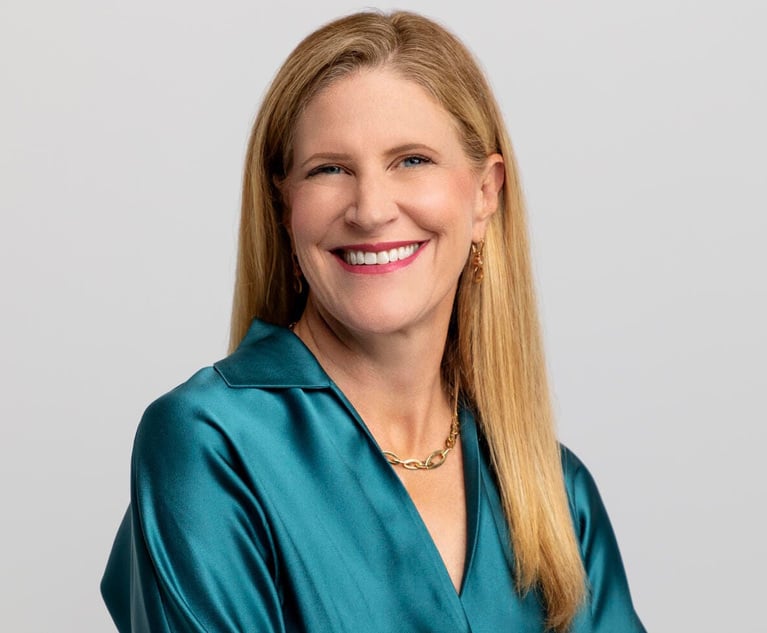Haunted by the Past, Wells Fargo Takes $1.6B Legal Charge
In a financial report that shows general counsel and interim CEO Allen Parker is still struggling mightily to overcome Wells Fargo & Co.'s past scandals, the bank is taking a $1.6 billion charge for legal costs that caught some observers by surprise.
October 16, 2019 at 04:53 PM
4 minute read
 C. Allen Parker, general counsel, and acting CEO, of Wells Fargo & Co.
C. Allen Parker, general counsel, and acting CEO, of Wells Fargo & Co.
In a financial report that shows general counsel and interim CEO Allen Parker is still struggling mightily to overcome Wells Fargo & Co.'s past scandals, the bank is taking a $1.6 billion charge for legal costs that caught some observers by surprise.
The Oct. 15 Wells Fargo quarterly earnings report, filed with the U.S. Securities and Exchange Commission, showed a whopping $1.8 billion increase in noninterest expenses over last quarter. The increase was driven mainly by $1.7 billion surge in operating losses, including the legal charge, along with $823 million paid for outside professional services, such as outside counsel and consultants.
A bank spokesman Tuesday declined to name the key law firms and payment amounts involved.
The bank's quarterly operating losses include "litigation accruals for a variety of matters, including a $1.6 billion discrete litigation accrual for previously disclosed retail sales practices matters." Exactly what that accrual will pay for is not yet clear. It could be for compliance efforts, or for future resolutions with regulators, or settlements with plaintiffs in numerous pending lawsuits, or all of the above.
The "retail sales matters" wording primarily refers to the 2016 fake account scandal, when the bank made money creating accounts for customers that they didn't ask for.
Details of the litigation following the fake account scandal are contained in the bank's previous quarterly report filed Aug. 2. This report also includes several other lesser, but more recent, scandals.
The bank has reached financial settlements with all the state attorneys general over the fake accounts scandal, but remains under investigation by the SEC, the U.S. Department of Justice and the Labor Department. The latter concerns the treatment of employees who were fired over the scandal.
It also has signed consent orders with the several other regulators. A key one, the Federal Reserve Board, has placed an ongoing cap on the bank's assets until the Federal Reserve is satisfied with Wells Fargo's efforts to enhance its corporate governance and board oversight.
Parker was hired as general counsel in 2017 to bring the bank through the crisis, settle the litigation and calm its relationships with regulators. He has served as interim CEO for the past six months until a new chief executive arrives Oct. 21, when he will return to the general counsel role.
Parker didn't agree to a Corporate Counsel request for an interview Tuesday, but his spokesman referred to statements made during the Oct. 15 earnings call with investors.
During the call, several analysts expressed surprise and disappointment at the $1.6 billion increase for legal costs. Some hoped it meant that settlements with the government are near.
Eric Compton, an equity analyst with Morningstar Inc., asked Parker if the bank was "getting toward the light at the end of the tunnel [on the scandal]. Should we start to see this—the legal reserve estimate—start to trend down?"
Parker responded, "As you know, we don't provide information as to the portion of our reserves that's allocable to any particular litigation or other items. And with regard to the DOJ and SEC investigations that began in 2016, we really don't have any update beyond what we said in our prepared remarks and what we previously disclosed in our last quarter 10-Q. Our discussions with the DOJ and SEC are ongoing. And when we have more information to disclose, we'll, of course, do so."
But a statement in the filing suggests the noninterest expense category might begin to taper off by the end of the fourth quarter. So far in the first three quarters of 2019 the company has logged roughly $42.5 billion on noninterest expense, including legal costs, or an average of about $14 billion per quarter.
The statement said the full year 2019 noninterest expense is expected to be about $53 billion, or about $13 billion for the quarter. But that number "excludes annual operating losses in excess of $600 million, such as litigation and remediation accruals and penalties," according to the report.
This content has been archived. It is available through our partners, LexisNexis® and Bloomberg Law.
To view this content, please continue to their sites.
Not a Lexis Subscriber?
Subscribe Now
Not a Bloomberg Law Subscriber?
Subscribe Now
NOT FOR REPRINT
© 2025 ALM Global, LLC, All Rights Reserved. Request academic re-use from www.copyright.com. All other uses, submit a request to [email protected]. For more information visit Asset & Logo Licensing.
You Might Like
View AllVisa's Defense of DOJ Antitrust Case Suffers Setback After Court Denies Motion to Dismiss

Wells Fargo and Bank of America Agree to Pay Combined $60 Million to Settle SEC Probe

Amex Latest Target as Regulators Scrutinize Whether Credit Card Issuers Deliver on Rewards Promises

Former Capital One Deputy GC Takes Legal Reins of AIG Spinoff
Trending Stories
Who Got The Work
J. Brugh Lower of Gibbons has entered an appearance for industrial equipment supplier Devco Corporation in a pending trademark infringement lawsuit. The suit, accusing the defendant of selling knock-off Graco products, was filed Dec. 18 in New Jersey District Court by Rivkin Radler on behalf of Graco Inc. and Graco Minnesota. The case, assigned to U.S. District Judge Zahid N. Quraishi, is 3:24-cv-11294, Graco Inc. et al v. Devco Corporation.
Who Got The Work
Rebecca Maller-Stein and Kent A. Yalowitz of Arnold & Porter Kaye Scholer have entered their appearances for Hanaco Venture Capital and its executives, Lior Prosor and David Frankel, in a pending securities lawsuit. The action, filed on Dec. 24 in New York Southern District Court by Zell, Aron & Co. on behalf of Goldeneye Advisors, accuses the defendants of negligently and fraudulently managing the plaintiff's $1 million investment. The case, assigned to U.S. District Judge Vernon S. Broderick, is 1:24-cv-09918, Goldeneye Advisors, LLC v. Hanaco Venture Capital, Ltd. et al.
Who Got The Work
Attorneys from A&O Shearman has stepped in as defense counsel for Toronto-Dominion Bank and other defendants in a pending securities class action. The suit, filed Dec. 11 in New York Southern District Court by Bleichmar Fonti & Auld, accuses the defendants of concealing the bank's 'pervasive' deficiencies in regards to its compliance with the Bank Secrecy Act and the quality of its anti-money laundering controls. The case, assigned to U.S. District Judge Arun Subramanian, is 1:24-cv-09445, Gonzalez v. The Toronto-Dominion Bank et al.
Who Got The Work
Crown Castle International, a Pennsylvania company providing shared communications infrastructure, has turned to Luke D. Wolf of Gordon Rees Scully Mansukhani to fend off a pending breach-of-contract lawsuit. The court action, filed Nov. 25 in Michigan Eastern District Court by Hooper Hathaway PC on behalf of The Town Residences LLC, accuses Crown Castle of failing to transfer approximately $30,000 in utility payments from T-Mobile in breach of a roof-top lease and assignment agreement. The case, assigned to U.S. District Judge Susan K. Declercq, is 2:24-cv-13131, The Town Residences LLC v. T-Mobile US, Inc. et al.
Who Got The Work
Wilfred P. Coronato and Daniel M. Schwartz of McCarter & English have stepped in as defense counsel to Electrolux Home Products Inc. in a pending product liability lawsuit. The court action, filed Nov. 26 in New York Eastern District Court by Poulos Lopiccolo PC and Nagel Rice LLP on behalf of David Stern, alleges that the defendant's refrigerators’ drawers and shelving repeatedly break and fall apart within months after purchase. The case, assigned to U.S. District Judge Joan M. Azrack, is 2:24-cv-08204, Stern v. Electrolux Home Products, Inc.
Featured Firms
Law Offices of Gary Martin Hays & Associates, P.C.
(470) 294-1674
Law Offices of Mark E. Salomone
(857) 444-6468
Smith & Hassler
(713) 739-1250






